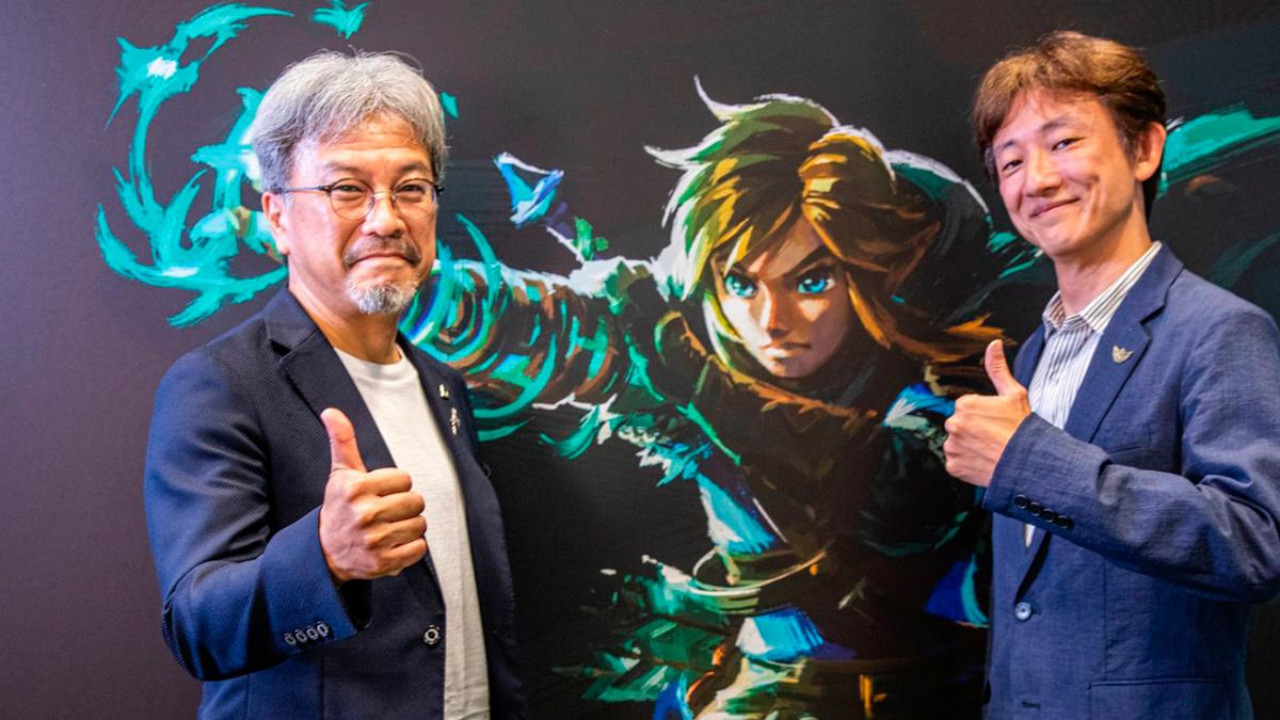Tears of the Kingdom Developers Talk Zelda Timeline in New Interview
Posted on December 09 2023 by Nick Miller

In a recent interview with Game Informer, The Legend of Zelda series producer Eiji Aonuma and Tears of the Kingdom‘s director Hidemaro Fujibayashi shared some of their thoughts on Tears of the Kingdom with the hindsight of being seven months since its release. They covered topics such as Tears of the Kingdom‘s reception, the possibility of a direct sequel to the game, and the Zelda timeline, among other things.
Debates surrounding the importance and validity of a Zelda timeline predate its official release in Hyrule Historia in 2011, so comments from primary sources at Nintendo will always be scrutinized as fans on either side of the debate dig their heels in. Hopefully, the comments made in this Game Informer interview will help put some of that debate to rest; but this is the internet, so they’ll probably just add more fuel to the fire. Here’s what they had to say.
Brian Shea of Game Informer conducted the interview. He asked:
When you’re developing a new Zelda title, obviously your primary focus is on core gameplay, but the timeline placement discussion has become more important and prevalent among the fans of the series. How much consideration and importance does the development team put into those discussions?
Hidemaro Fujibayashi: As you mentioned, we realized that fans have a great time theorizing and enjoy thinking about where things fit on the timeline. That’s something that the development team recognizes and it considers, but to an extent. And I say, “to an extent” because if we get too into the weeds or too detailed in that placement, it results in kind of creating restraints for our creativity; the process of creating new ideas becomes restricted because we’re so tied up and trying to make this fit into a very specific spot in the timeline. We do consider it, but not to an extent where we feel that our development process feels restricted or constrained.
Eiji Aonuma: Another point kind of related to this is that as we’ve been able to realize more fully a real, working world because of technology, you are also able to fine-tune all the details of that world. But, we don’t always want to do that just because we now can. Instead, as people play the game, we want to give them the ability to exist in that world and a world that they can interpret in their own way. And, so, that’s also something that we really keep in mind as we’re continuing to develop games.
Have you heard the theory that some scenes in Tears of the Kingdom are perhaps loose retellings of some events from Ocarina of Time?
EA: Oh, no. I’m hearing that for the first time.
Well, there’s Rauru, there’s the Imprisoning War, and there are some scenes in Tears of the Kingdom that resemble scenes in Ocarina of Time, particularly in the flashbacks. For example, you have the scene where Ganondorf is kneeling before the king of Hyrule before he betrays him.
HF: We understand that fans have theories and that’s a fun thing to do for fans. We also think about what kinds of theories fans may come up with given what we create. It’s not like we’re trying to plan ahead for those theories, but in the series, there’s this idea of reincarnation in that Zelda and Link, as they appear in the different titles, they are not the same person per se, but there’s sort of this fundamental soul that carries on. Because of that, certain scenes may turn out similar, like you were saying, the antagonist kneeling before the king, those scenes might turn out because they are sort of like glimpses or representations of the soul of the series. For people to kind of pick up on that and see that, it’s something that we enjoy also and it kind of helps create this myth of The Legend of Zelda.
Does the Hyrule we saw in the flashback scenes in Tears of the Kingdom predate Skyward Sword or does it come after the other games in the timeline?
HF: Obviously, there’s something a little bit clearer in our minds, but of course, it could be that we’re wrong as well! [Laughs] I kind of want to pose the idea that, like in real-life history, you define by the artifacts and by the data that you currently have. So within what we have, there might be a correct answer, but it could be a different answer. So, I guess my answer would be that it could be both. Both could be correct.
EA: I mean, The Legend of Zelda is a series of games that focus on puzzle solving, so this is just another sort of puzzle that the users will have to see if they can solve and think about. [Laughs]

As usual, the developers’ responses to timeline questions are somewhat ambiguous, doing little to crown any one side of the debate a victor, but providing more fuel for discussion. Their comments do suggest, however, that the timeline is a secondary concern, with making the game fun and interesting being their primary focus for the development of any Zelda game. As such, it seems that the Zelda timeline is fluid, able to morph and adapt to accommodate new games, new stories, and new characters.
Something that could be easily overlooked from this interview is the interesting bit of lore that Fujibayashi dropped in his comments on reincarnation. We’ve known for some time that each game’s representation of Link and Zelda are reincarnated from the heroes and princesses of past, but the suggestion that similar events transpire from game to game because of their continuous souls influencing the characters’ decisions may shed new light on the stories of all Zelda games. Fans could have fun theorizing specific instances in which the actions of a character in one game directly influenced an event in a later game. Such an idea has the potential to add a new depth to the series and a stronger bond between the games and their characters.
So, tell us your thoughts. What do you think of the Zelda timeline? Have these comments changed or deepened your opinion of it? Is there value in a timeline that is subject to change? Let us know in the comments.
Source: Game Informer (via Nintendo Life)

Nick is a writer for Zelda Dungeon and a longtime fan of the Zelda franchise. In his free time, he enjoys fishing, archery, skateboarding, and some good ol’ fashioned family time. He’s an advocate for physical media and an avid video game collector. His favorite Zelda game is Ocarina of Time, though Breath of the Wild and the Link’s Awakening remake are close contenders. His other favorite video games series include Kingdom Hearts, Fallout, and Ratchet & Clank.



